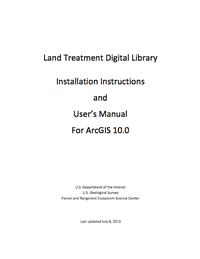Data Entry Module and Manuals for the Land Treatment Digital Library
Links
- Document: Report (4.29 MB pdf)
- Companion Files:
- Companion Files (942 MB zip) - Land Treatment Digital Library Data 10.1
- Companion Files (4.19 MB pdf) - Land Treatment Digital Library User Guides for ArcGIS 10.0
- Companion Files (913 MB zip) - Land Treatment Digital Library Data 10.0
- Companion Files (5.55 MB zip) - Land Treatment Digital Library User Guides for ArcGIS 10.1
- Companion Files (5.55 MB zip) - Land Treatment Digital Library User Guides for ArcGIS 10.0
- Metadata: Metadata (30.1 KB zip) - Land Treatment Digital Library Metadata
- Superseding Publications:
- Download citation as: RIS | Dublin Core
Abstract
Across the country, public land managers make decisions each year that influence landscapes and ecosystems within their jurisdictions. Many of these decisions involve vegetation manipulations, which often are referred to as land treatments. These treatments include removal or alteration of plant biomass, seeding of burned areas, application of herbicides, and other activities. Data documenting these land treatments usually are stored at local management offices in various formats. Therefore, anyone interested in the types and effects of land treatments across multiple jurisdictions must first assemble the information, which can be difficult if data discovery and organization involve multiple local offices. A centralized system for storing and accessing the data helps inform land managers when making policy and management considerations and assists scientists in developing sampling designs and studies.
The Land Treatment Digital Library (LTDL) was created by the U.S. Geological Survey (USGS) as a comprehensive database incorporating tabular data, documentation, photographs, and spatial data about land treatments in a single system. It was developed over a period of several years and refined based on feedback from partner agencies and stakeholders. Currently, Bureau of Land Management (BLM) land treatment data are being entered by USGS personnel as part of a memorandum of understanding between the USGS and BLM. The LTDL has a website maintained by the USGS Forest and Rangeland Ecosystem Science Center where LTDL data can be viewed https://www.usgs.gov/apps/ltdl.
The resources and information provided in this data series allow other agencies, organizations, and individuals to download an empty, stand-alone LTDL database to individual or networked computers. Data entered in these databases may be submitted to the USGS for possible inclusion in the online LTDL.
Multiple computer programs are used to accomplish the objective of the LTDL. The support of an information-technology specialist or professionals familiar with Microsoft Access™, ESRI’s ArcGIS™, Python, Adobe Acrobat Professional™, and computer settings is essential when installing and operating the LTDL. After the program is operational, a critical element for successful data entry is an understanding of the difference between database tables and forms, and how to edit data in both formats. Complete instructions accompany the program, and they should be followed carefully to ensure the setup and operation of the database goes smoothly.
Suggested Citation
Welty, J.L., and Pilliod, D.S., 2013, Data entry module and manuals for the Land Treatment Digital Library: U.S. Geological Survey Data Series 749, https://pubs.usgs.gov/ds/749.
ISSN: 2327-638X (online)
| Publication type | Report |
|---|---|
| Publication Subtype | USGS Numbered Series |
| Title | Data entry module and manuals for the Land Treatment Digital Library |
| Series title | Data Series |
| Series number | 749 |
| DOI | 10.3133/ds749 |
| Publication Date | July 24, 2013 |
| Year Published | 2013 |
| Language | English |
| Publisher | U.S. Geological Survey |
| Publisher location | Reston, VA |
| Contributing office(s) | Forest and Rangeland Ecosystem Science Center |
| Description | Pamphlet: 56 p.; 5 Companion Files; Metadata |
| Online Only (Y/N) | Y |
| Additional Online Files (Y/N) | Y |


